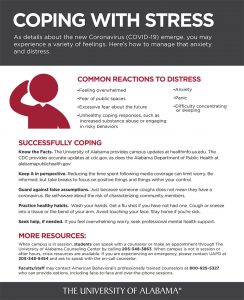 As details emerge and continue to change with COVID-19, many people are experiencing feelings of worry and anxiety. It’s important to manage stress during this unprecedented crisis.
As details emerge and continue to change with COVID-19, many people are experiencing feelings of worry and anxiety. It’s important to manage stress during this unprecedented crisis.
“Self-care is vital,” said Dr. Sha-Rhonda Green, assistant professor of social work at UA. “We have to take an active role in protecting our own well-being. If people ‘abandon’ themselves, their emotional health could be susceptible to a mental health crisis.”
There are simple things people can do to take care of themselves, such as keep a daily routine, sleep well, eat healthy, take breaks and exercise, according to Green.
“With many faculty and staff telecommuting, it’s important to have a schedule, because it’s predictable,” said Green. “Write your schedule down so that everyone in the house can see it. And remember to have occasional time and space away from the others in your house for self-care, outside of work time.”
Green also suggests that faculty and staff create at-home work environments that bring comfort, with items like pictures of family, friends and fun memories, or other objects that bring joy.
“Our thoughts affect our behavior, so it is important to focus and reflect on the positives to stay grateful and grounded,” she said.
Green recommends limiting social media, getting news information from reliable sources and perhaps most importantly, having plenty of compassion for yourself and others during this time.
Other ways to cope with stress
- Know the facts. The University of Alabama provides campus updates at healthinfo.ua.edu. The CDC provides accurate updates at cdc.gov, as does the Alabama Department of Public Health at alabamapublichealth.gov.
- Keep it in perspective. Reducing the time spent following media coverage can limit worry. Be informed, but take breaks to focus on positive things and things within your control.
- Guard against false assumptions. Just because someone coughs does not mean they have a coronavirus. Be self-aware about the risk of characterizing community members.
- Practice healthy habits. Wash your hands. Get a flu shot if you have not had one. Cough or sneeze into a tissue or the bend of your arm. Avoid touching your face. Stay home if you’re sick.
- Seek help, if needed. If you feel overwhelming worry, seek professional mental health support. Faculty and staff may contact American Behavioral’s professionally trained counselors at 800-925-5327 who can provide options, including face-to-face and over-the-phone sessions.
More resources
Wellness and Work-Life is offering a webinar called “Coping with a Crisis: Your Mental Health Wellbeing” Thursday, March 26, from 10-11 a.m. to help UA employees learn techniques for coping with crisis. Register through the wellness portal.
For additional COVID-19 coping resources, visit the Wellness and Work-life website.
